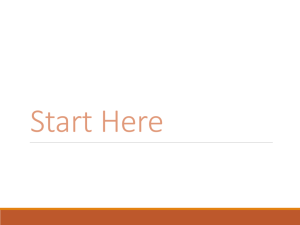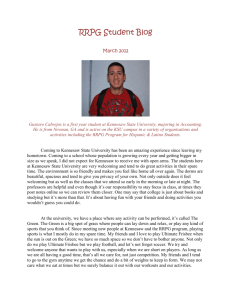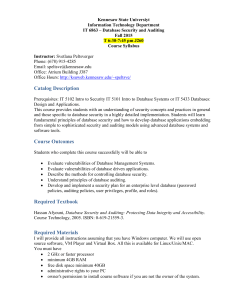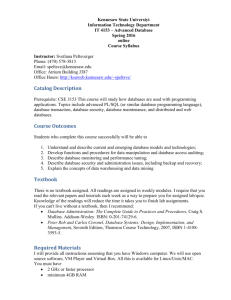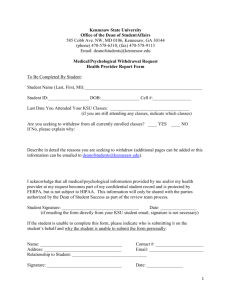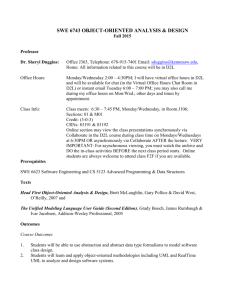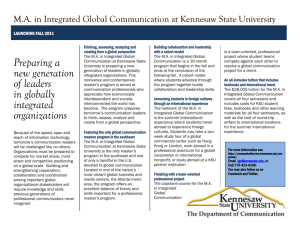Taking This Course - Kennesaw State University
advertisement
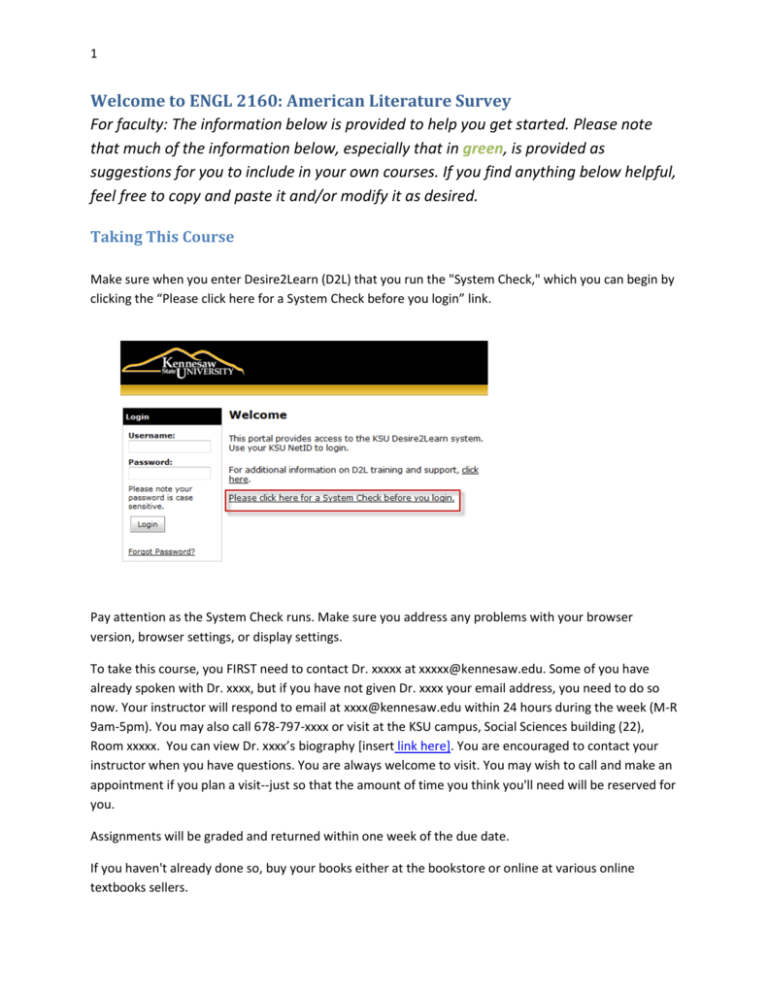
1 Welcome to ENGL 2160: American Literature Survey For faculty: The information below is provided to help you get started. Please note that much of the information below, especially that in green, is provided as suggestions for you to include in your own courses. If you find anything below helpful, feel free to copy and paste it and/or modify it as desired. Taking This Course Make sure when you enter Desire2Learn (D2L) that you run the "System Check," which you can begin by clicking the “Please click here for a System Check before you login” link. Pay attention as the System Check runs. Make sure you address any problems with your browser version, browser settings, or display settings. To take this course, you FIRST need to contact Dr. xxxxx at xxxxx@kennesaw.edu. Some of you have already spoken with Dr. xxxx, but if you have not given Dr. xxxx your email address, you need to do so now. Your instructor will respond to email at xxxx@kennesaw.edu within 24 hours during the week (M-R 9am-5pm). You may also call 678-797-xxxx or visit at the KSU campus, Social Sciences building (22), Room xxxxx. You can view Dr. xxxx’s biography [insert link here]. You are encouraged to contact your instructor when you have questions. You are always welcome to visit. You may wish to call and make an appointment if you plan a visit--just so that the amount of time you think you'll need will be reserved for you. Assignments will be graded and returned within one week of the due date. If you haven't already done so, buy your books either at the bookstore or online at various online textbooks sellers. 2 Your syllabus is located on the D2L home page. Your course schedule is located on the D2L Home Page. Pre-Requisites This section is provided as an example for you as a location in which you might provide prerequisite information for your students. Pre-reqs ARE A QM STANDARD! If you don’t have any pre-requisites, you might type in “none” or “There are no pre-requisites for this course.” Course Description This section is provided as an example for you as a location in which you might provide the course description (as taken from your syllabus) in the introduction to your course. Textbooks and Materials: Baym, Nina, Ed. The Norton Anthology of American Literature, Shorter Seventh Edition. NY: W. W. Norton and Company, 2008. Access to a computer with reliable internet access and sound and video capabilities. Note: Many of our videos are in Flash and require a program like iTunes or RealPlayer to view. Both are available free—iTunes is available at http://www.apple.com/itunes/overview/?cid=OAS-US-DOMAINSitunes.com, and RealPlayer is available at www.RealPlayer.com. Because many of our videos are in Flash, you will not be able to rely solely on an iPad or iPhone to successfully complete this course. You will need a desktop or laptop computer or a tablet computer that runs Flash. ADA Statement Kennesaw State University provides program accessibility and reasonable accommodations for persons defined as disabled under Section 504 of the Rehabilitation Act of 1973 and the Americans with Disabilities Act. Kennesaw State University's Student Disability Services can be accessed at http://www.kennesaw.edu/stu_dev/dsss/welcome.html KSU’s Institutional Policies for Student Disability Services can be accessed here: http://www.kennesaw.edu/stu_dev/dsss/policies.shtml Software Accessibility Statements D2L: http://www.brightspace.com/about/accessibility/standards/ VoiceThread: http://voicethread.com/about/features/accessibility/ 3 Panopto: http://support.panopto.com/documentation/viewing/accessibility-features Kaltura: http://corp.kaltura.com/sites/default/files/Datasheets/Kaltura%20Accessibility%20Datasheet.pdf SoftChalk: http://softchalk.com/products/softchalk/accessibility Student Services KSU provides a variety of services to foster and support student success. To learn more, click here: http://www.kennesaw.edu/studentsuccessservices/ Academic Policies Students are expected to comply with KSU's academic policies, listed here: http://registrar.kennesaw.edu/policies/ Please note that plagiarism detection software is in place in this course for all assignments. Even if you do not turn work in to the Dropbox, your work may be scanned for plagiarism. If you are caught plagiarizing, plagiarism penalties will apply. To learn more about the definition of academic misconduct at KSU, click here: https://web.kennesaw.edu/scai/content/ksu-student-code-conduct#2 Software Privacy Statements D2L: http://www.brightspace.com/legal/privacy/ VoiceThread: https://voicethread.com/support/howto/Privacy_and_Security/ Panopto: http://panopto.com/privacy/ Kaltura: http://corp.kaltura.com/privacy-policy SoftChalk: http://softchalk.com/about/privacy-policy PBWorks: http://www.pbworks.com/privacy-policy.html Goals (remember, goals must be measurable; they must use verifiable verbs) 1. At the end of the course, students should be able to name in chronological order, delineate, and provide examples of the major movements in American literature: Enlightenment, Transcendentalism, romanticism, regionalism and realism, Modernism, the Harlem Renaissance, the Southern Renaissance, and postmodernism. 2. At the end of the course, students should be able to define each movement, name authors from each movement, name works from each movement by the named authors, and explain how aspects of each work reflect the movement they belong to. 4 3. Students should be able to name major themes in American literature and explain how works from each movement reflect those themes 4. In addition, students should be able to name, provide examples of, and describe major themes within transition writers and writers who fall outside the movements. 5. Students will demonstrate their abilities to analyze a literary work using close reading and paying attention to the context of the work. 6. Students should be able to explain how events in American history shape American literature, and how American literature reflects the multifaceted core of what it means to be American. Skills and Other Things You Need You will need basic computer skills. Can you find a web site if you are given a web address? Can you send and receive an email? Can you attach files and open attachments? If you can, then you will probably have few problems with the technology in this course. You will also need regular access to a computer and Internet service. You can use the labs on campus if you buy a set of headphones. Right now, write down two backup places that you will go if your preferred email access point fails. For example, if you try to get on the internet and you find your home access won't work, where will you go? Then, if during the class you have trouble, you can go to your backup place. Can you go to the local library? To the local community college? To your Aunt's house? If you have no backup places, you probably don't need to take this course. In other words, if your internet fails, it may severely hinder your progress in this class. You will need an email account that you check every day, and your facilitator needs that account address. Email failures, like internet failures, can severely hinder your progress in this course. You will turn in all assignments in the D2L Dropbox unless otherwise assigned. Acceptable formats for turning materials in to the Dropbox are Corel WordPerfect (.wpd) Encapsulated PostScript (.eps) Microsoft Word (.doc, .docx) plain text (.txt) Portable Document Format (.pdf) Rich Text Format (.rtf) web pages (.htm, .html) No other formats are accepted. If you turn in documents in other formats, your work will be counted late until you turn in the assignment in the correct format. 5 How the Course Works (example if you have a hybrid course) English 2160 is a hybrid course. We will meet online on Tuesdays (that is, the modules will come available on Friday and be due on Tuesday at midnight. You can complete your assignment anytime between Friday at midnight and Tuesday at midnight). Your schedule will outline the topic for each module. For your online modules, your quizzes, course content, and assignment(s) will become visible at midnight on Friday nights. You will have until midnight on the next Tuesday to access the materials and complete any activities there. You choose when you access the content within the given time frames. You will review the materials--this activity should take about 3 hours, including download/access time. You should expect to spend about five hours per week on this course, including reviewing materials, completing activities, and working on your own web course. Face to face meetings will take place in the room designated on the schedule and will last one hour and fifteen minutes. Look in for the Module 1: Online to see your video introduction to the course. Bill's Adventures in English 2160 (a concrete sample of how an internet course might progress--this information is provided for you as something you might provide for your students if you teach completely online) A concrete example of how this course works (in this course, the class meets online on Tuesdays and face to face on Fridays) Before the class begins Bill is a student in our course. He signs in by phone or email or in person with the professor before the course begins, and he gives her his email address. He also takes down the course information. The first day of classes The day classes begin, which is a Saturday, he makes sure English 2160 shows up on his Desire2Learn (D2L) site. He is ready to begin the course. Bill knows his information to get started with the course is available under Module 1: Online. However, Bill works until 5pm on Mondays, so he waits until 7pm that night and accesses the D2L course site. He reads the orientation in the Start Here module (what you're reading right now) on D2L. He reads it and writes down questions for his professor, and he emails his professor with his questions. In Module1: Online, Bill finds the goals and objectives, the netiquette guidelines, the information on changing his default settings, the video lecture, and the self-assessment and discussion board assignment. 6 Week 1: Thursday Bill has a busy week, so he accesses the introductory materials, including the lecture, and completes the discussion board assignment to prepare for class on Friday. He also looks at what to bring for the face to face section under Module 2: Face to Face. Week 1: Friday Bill comes to class on Friday prepared for the day. He has read and brought homework and handouts to class, as specified in Module 2: Face to Face. He takes notes in class, participates, and asks questions when he has them. He leaves class and goes to work. Week 2: Sunday He reads his assignments from the syllabus on Sunday. His online module came available Friday at midnight. From the syllabus, he knows he is supposed to read Read Markel, chapter 1: "Understanding the Technical Environment" and chapter 2: "Understanding Ethical and Legal Considerations." When he completes his reading on Sunday evening, he takes his quiz on the readings under Module 3: Online on D2L. He then completes the additional activities and listens to a recorded lecture from the professor. He knows he has until midnight on Tuesday, but he decides to go ahead and get it done. Week 2: Wednesday After work on Tuesday, Bill goes bowling. So, on Wednesday night he looks in the discussion board to see what his classmates have said about themselves, and he asks a classmate named Rita about her lasagna recipe that she mentioned she was famous for. It sounds like a great recipe to have. He then accesses Module 4: Face to Face at 7pm. He takes note of what he needs to read for the face to face session, and he reads it. He writes down questions to ask in class. He finishes this work about 8:30pm. He goes to bed. Week 2: Friday Bill comes to class on Friday prepared for the day. He has read and brought homework and handouts to class, as specified in Module 4: Face to Face. He takes notes in class, participates, and asks questions when he has them. The professor assigns a research paper and presents a choice of assignments. As Bill thinks about his topic, he decides to look again at the Class Lounge. A classmate named Felipe is also a communications major, just as Bill is, so he asks Felipe via the Lounge if he has thought of any topics regarding ethics in their shared major. And so it goes . . . 7 The important thing to remember is stay on top of the class so that the activities and expectations don't crunch you. If you try to do everything an hour before it is due, you will find that activities, life, and technology will get in your way. As your professor, I will try to keep you updated every other week on your progress during the course. Always let your professor know if you run into difficulties. Course Expectations (example for you) Students are expected to attend the electronic lectures and face to face classes in a timely fashion and to keep up with the course schedule. Attendance is monitored using D2L. Late assignments may or may not be accepted. If accepted, late assignments lose 10 points per day late. Day 1 of late begins after the due date and time. View the netiquette guidelines (http://www.kennesaw.edu/elearning/netiquette/index.html) for information regarding behavioral expectations for online students. Plagiarism (http://www.kennesaw.edu/elearning/tutorials/68plagiarism.html) carries with it penalties, including a failing grade for the course. Monday Tuesday Wednesday Thursday Friday Saturday Take reading quiz on upcoming module/reading assignment before noon. Spend one hour accessing content. Open module and spend two hours accessing content Complete activities in module before midnight. Read for Friday face to face meeting Attend face to face class, take notes, and ask questions. Online Take module the day comes off. available midnight on Friday. Do nothing. Look at assignments and prepare for Friday face to face meeting. Sunday 8 SAMPLE SCHEDULE 2 Monday Tuesday Wednesday Thursday Friday Online module opened Friday at midnight. Ignore it. Open module and spend three hours accessing content Complete activities in module. Read for Friday Take the face to face day off. meeting. Look in face to face module and prepare for class. Attend face to face class, take notes, and ask questions. Saturday Sunday Online module Take comes available the day Friday at off. midnight. Open module and spend three hours accessing content Complete activities in module. Grades Grade Breakdown PLEASE NOTE THAT ON ALL ASSIGNMENTS, MORE THAN NINE GRAMMAR OR MECHANICAL ERRORS ON ANY ASSIGNMENT WILL RESULT IN AN AUTOMATIC F. Instructions 5% (50 points) Definition and Description=10% (100 points) Midterm=10% (100 points) Proposal=15% (150 points) Technical Report=25% (250 points) Final=10% (100 points) Module Activities and Quizzes=25% (I will take all of the points you received for your quizzes and VoiceThreads and job application materials and any other assignments that are not the instructions, def and desc., mid term, proposal, tech report, or final, and divide the points you received by the number of points possible. Then I will multiply the result by 250 so that the grade you receive for this section is out of 250 points. Feel free to look at your gradebook for assignments and their points possible. New assignments in this category may be added as the course progresses.) Those assignments, at this point, are as follows: CORRECT OR SCOOPED VoiceThreads Introduce Yourself (10) Ethics (10) Audience Analysis (10) Organization (10) Argument Games (10) Description (10) 9 Writing Review (10) Design and Graphics (10) What Do You Think? (10) Quizzes 1 and 2: 10 3, 4: 10 5, 6, 13: 10 8: 10 Module 8: 10 Proposal: 10 7: 10 11: 10 Informational Reports: 10 Formal Reports: 10 Writing Letters:10 Job Ap Mat: 10 Oral Pres: 10 Activities Ethics Quiz: 10 Research Topic: 10 Grammar and Spelling Self-Inventory 25 Grant Activity: 25 Formal Report Activity: 45 Job Ad: 10 Resume: 25 Cover Letter: 25 Total Points Possible for Module Activities and Quizzes: 395 Your gradebook function will automatically calculate your grade for you throughout the course, although the weighting on the Homework, In Class Work, and Quizzes will be off until the end of class. 10 Additional Information 1.) Your professor will respond to email at xxxxx@kennesaw.edu within 24 hours during the week (M-R 9am-5pm). You may also call 678-xxx-xxx or visit at the KSU campus, Social Sciences building (22), Room xxx. You may wish to call and make an appointment if you plan a visit--just so that the amount of time you think you'll need will be reserved for you. 2.) Assignments will be graded, and grades will be posted, within 1 week after the assignment due date. If the instructor anticipates a delay in grading, you will be notified as soon as possible. 3.) Technical support is your responsibility. If a document or lecture does not open for you, let your instructor know. Sometimes your instructor can put information in a different format that you can access more easily. However, if the problem is on your end (your computer, your software, your modem), it is your responsibility to find someone on your end to help you with the 11 problem. If you are on KSU campus, contact service@kennesaw.edu. Your instructor is not technical support. Again, please let your instructor know if you have any questions. It’s a good idea, at the end of your “Start Here” material, to let students know what to do next.
